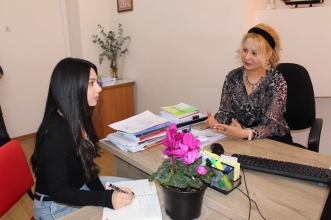"Mother language has a national preservation significance:" Mary Sargsyan
February 21, 2022
February 21 is celebrated as International Mother Language Day.
The Public Relations and Career Department of the ISEC NAS RA talked with Mary Sargsyan, the Scientific Secretary of the ISEC NAS RA, Head of the Chair of Linguistics, Candidate of Philological Sciences, Associate Professor on this topic.
- Mrs. Sargsyan, it is known that February 21 is celebrated as International Mother Language Day. Where do the roots of the day come from? and What is its meaning?
- In the wake of a series of uprisings against mother language rights in the middle of the last century, UNESCO declared February 21st as the International Mother Language Day to promote the recognition and use of language rights in 1999. International Mother Language Day perpetuates the political struggle for the recognition of Bengali as a separate language some sixty years ago. In 1952, a group of young people was shot dead by police in Dhaka in protest of the government's decision to recognize Urdu as the only state language. In commemoration of this struggle, UNESCO has been celebrating International Mother Language Day since 1999, and in 2008 it has been declared the International Day of Languages. A monument to the Preserving Mother Langauge has been erected in Sydney's Ashfield Park to commemorate the Bengali struggle.
- It is known that there are about 7000 languages in the world today. Some of these languages have long been extinct, some are endangered on the way to becoming extinct. What problems do we face today in preserving the mother language?
- In the 21st century, language learning, bilingualism, and multilingualism have become major imperative. Knowledge of languages creates wider job, professional opportunities. Therefore, it is essential to master especially international languages. And we know that today, in the conditions of globalization, the international languages, "Lingua Franks" are gradually forcing people to give up their mother languages.
However, practice shows that it is possible to speak several languages, but not at the expense of the mother language. There is a hardened opinion that only the relevant bodies should deal with the preservation and development of the mother language, but the mother language belongs to each of us, is a part of our essence and vital activity. Therefore, we should all treat our mother language with the same care and love as we treat our loved ones. Just as we clean our house every day, wash our clothes, we must try to clean our vocabulary, get rid of foreign structures, parasitic words, redundancies, slang words. Being literate will only give us more brilliance and dignity.
- What activities does the Chair of Linguistics of the ISEC of the NAS RA carry out in the direction of normative use of the mother language?
- The Chair of Linguistics of the ISEC of the NAS RA, both the tutoring staff and the current masters and graduate students carry out active work in the direction of purity and normative use of the mother language. The chair is taught by highly qualified specialists in the field of education and science, who actively participate in various national and international conferences, have close contacts with foreign scientists, present the results of their research to the general scientific community, actively participate in discussing linguistic and political issues in the country.
- Nowadays, it is very important to instill the role of the mother language, its importance, and preservation in young and new generations. What is the participation of the students of the Center in that direction?
- Our students are not left out of language preservation work. For example, our graduate students are members of the Council of Young Language Defenders at the Institute of Language of the National Academy of Sciences. The first event, which brought great prestige to the youth, was quite interesting, it was entitled "Let's clean the city from language mistakes". Our undergraduates, along with other volunteers, regularly posted articles on their Facebook page about right-wrong language versions, Armenian equivalents, similar but different words, acceptable combinations. It is planned to publish a collection "Similar but different" soon, one of the co-authors of which is Naira Khachibabyan, a graduate of the Chair of Linguistics of the ISEC of the NAS RA and now a researcher of the National Academy of Sciences.
- Mrs. Sargsyan, what would you like to wish on Mother Language Day?
- I’d like to congratulate all of us on this wonderful holiday in February, I wish that our society recognizes the mother language as a national value, so we have no problem preserving it, freeing it from foreign elements. After all, for our people, the mother language has a national significance, as does religion, culture, and the institution of the family. Knowledge, preservation, and dissemination of the mother language are extremely important for the preservation of the Armenian identity.
The Public Relations and Career Department of ISEC of the NAS RA
